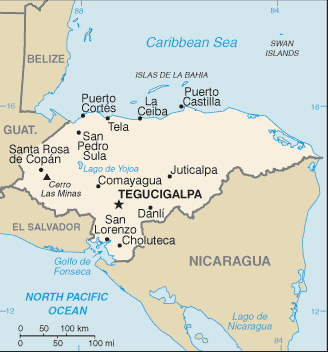Now the world’s most murderous country, Honduras’ Congress voted on Tuesday to deploy the army to fight drug cartels.
 A majority voted in favor of following the model of Mexican President Felipe Calderon who unleashed the Mexican army on the streets to battle powerful drug gangs back in 2006. That model has failed, increasing violence overall and bolstering the power of the drug cartels.
A majority voted in favor of following the model of Mexican President Felipe Calderon who unleashed the Mexican army on the streets to battle powerful drug gangs back in 2006. That model has failed, increasing violence overall and bolstering the power of the drug cartels.
Flush with U.S. money, weapons, and support, though, the Honduran government has decided to follow that failed strategy.
Almost half of the cocaine imported to the United States now passes through Honduras — a total of 20 to 25 tons each month, according to U.S. and Honduran estimates. The tiny country has become a hub of the drug trade and of Mexican drug gangs seeking haven from the militarized response to the drug war from President Calderon.
Violence has thus spiked in Honduras, with 82 murders per 100,000 people last year according to the United Nations. Around 20 people per day are killed in Honduras.
The United States has been pushing a hyper-militarized approach to the drug war for some time now. And the consequences of Mexico’s battle as well as a military coup that ousted leftist President Manuel Zelaya have presented prime opportunities to push for that approach in Honduras too.
U.S. aid to the essentially military regime in Honduras has increased every single year since the coup in 2009, with $68 million allocated for 2012. As Dana Frank at Nation magazine has documented, Obama has “allocated $45 million in new funds for military construction, including expansion and improvement of the jointly operated Soto Cano Air Force Base at Palmerola (supplied now with US drones) and has opened three new military bases.”
The “Honduran police and military have launched successive waves of repression against entire campesino communities,” Frank explained, and funding “rose dramatically in June with $40 million more under the new $200 million Central American Regional Security Initiative, supposedly to combat drug trafficking in Central America.”
More than 45,000 people have died since President Calderon started using the military to fight the drug gangs. Human Rights Watch recently released a report providing evidence that Mexico’s security forces participated in “more than 170 cases of torture, 39 ‘disappearances,’ and 24 extrajudicial killings since Calderón took office in December 2006.” And the drug cartels are more powerful than ever.
Despite the overwhelming support for similar policies in Honduras, most observers expect similar results.


